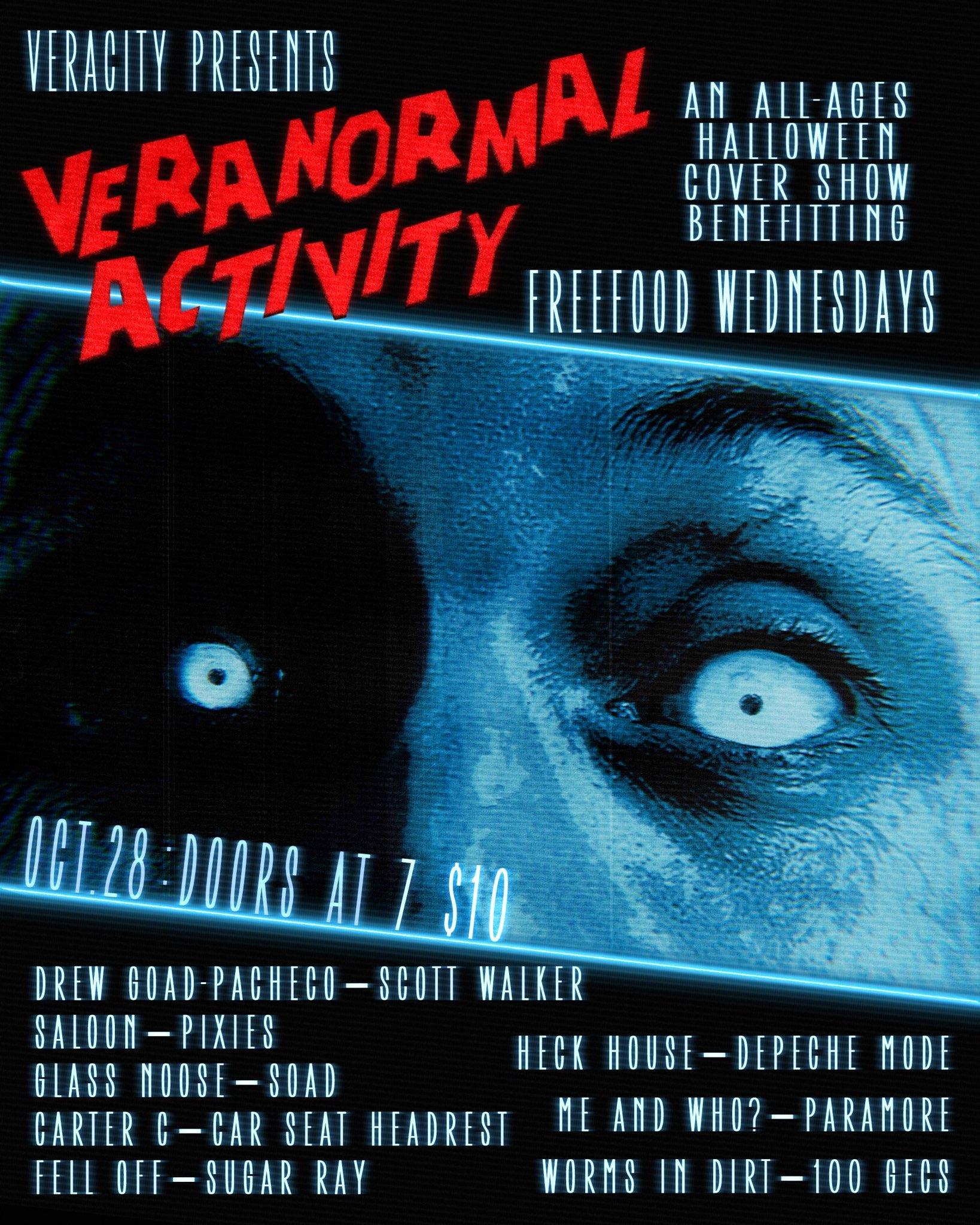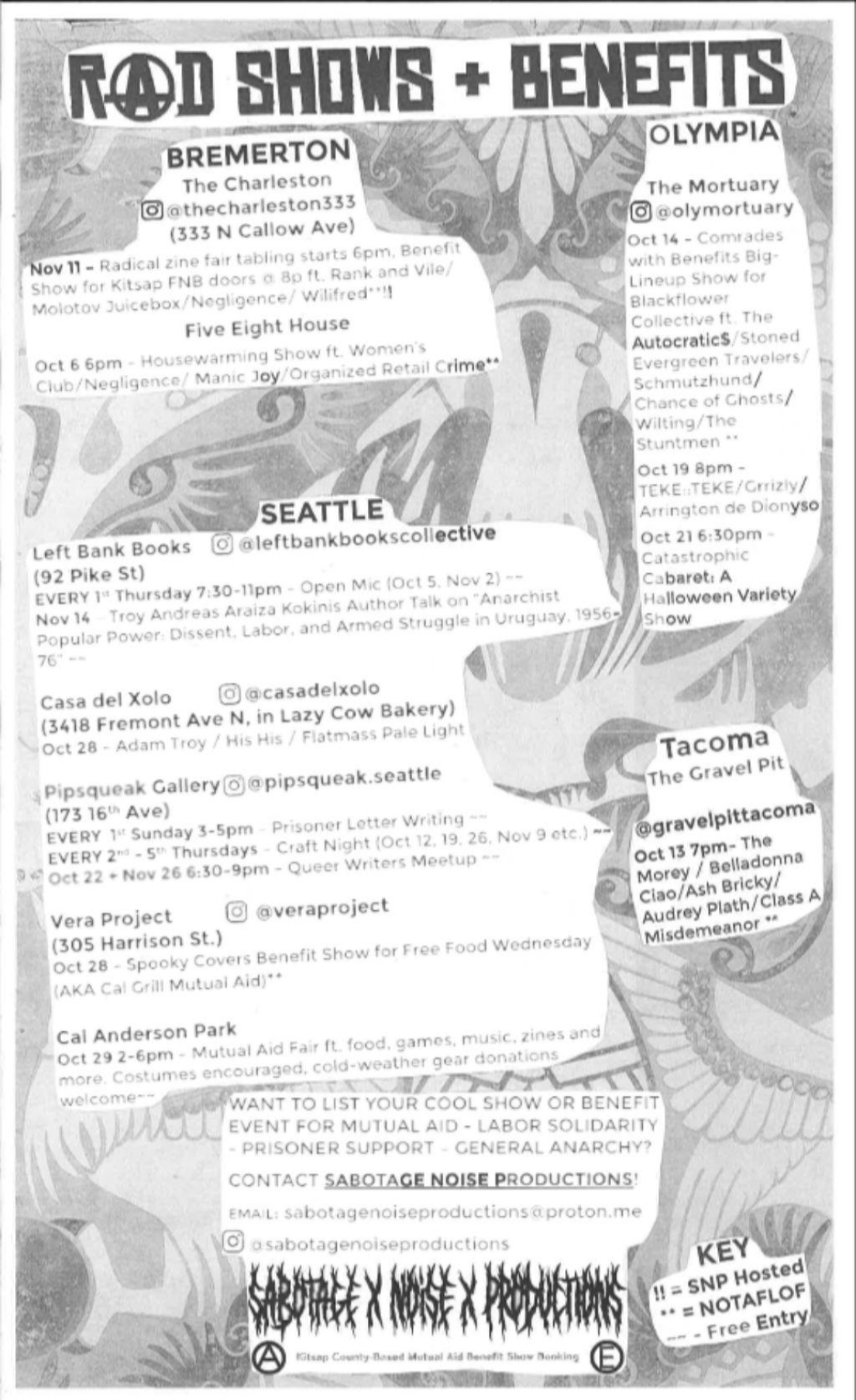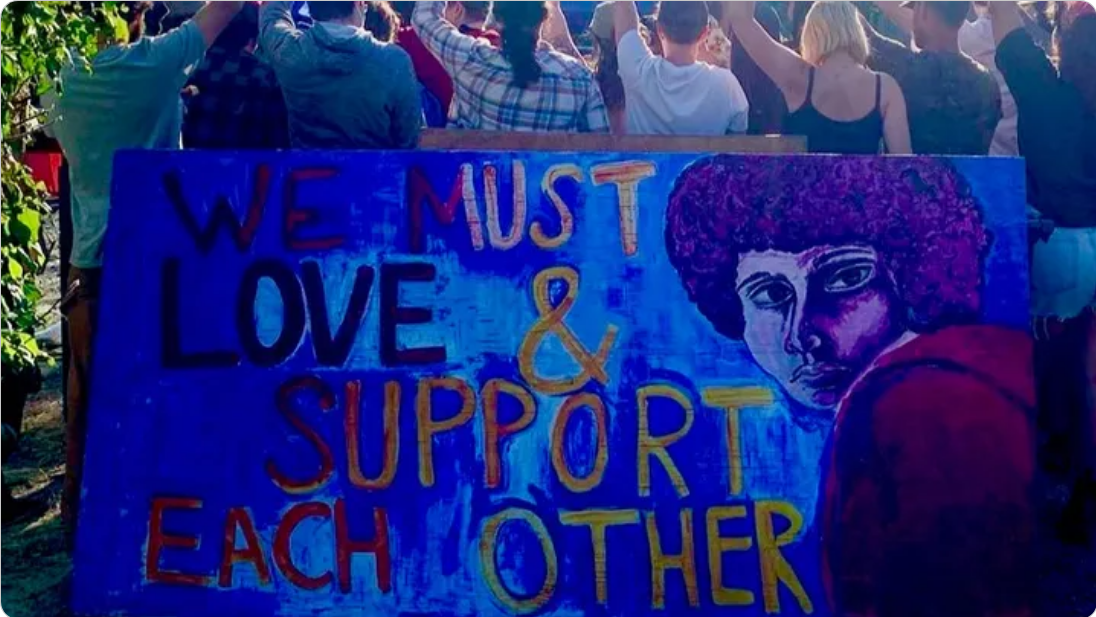In Olympia at The Mortuary.
Doors open at 8pm.
In Seattle near the Othello light rail stop:
At The Vera Project:
At the corner of Warren and Republican
305 Harrison Street, Seattle, WA 98109
info@theveraproject.org
Online from the Solidarity Apothecary:
Online from The Institute For Social Ecology:
Food and Climate Justice Online Course
Reading materials and lecture recordings provided. Instructors Brian Tokar and Grace Gershuny.
As the world faces intersecting crises of climate, health, and multiple social inequities, movements for climate and food justice are playing a central role toward developing a community-centered grassroots response. These movements share common themes, viewing the sources of these crises in institutions of hierarchy and domination, including capitalist structures of racism and colonialism. The extraction of resources and exploitation of marginalized populations for food and energy production, especially in the Global South, are major contributors to worldwide environmental and social degradation.
This course will offer a Social Ecology perspective on the background and potential of the climate and food justice movements to resist further damage from fossil fuels and agribusiness dominance, while building ecologically harmonious and equitable food and energy systems that can restore soil health, biodiversity, and climate stability.
Each segment will highlight the leadership of frontline communities in shifting the paradigm towards the fundamental principles of non-hierarchy, direct democracy, and unity in diversity. Case studies of particular projects will include video interviews and presentations by frontline advocates as well as recommended readings and other video and audio resources.
Other Courses Available Including:
Food and Climate Justice: Resistance and Liberation, with Brian Tokar and Grace Gershuny. Begins October 23 on Mondays at 7 pm Eastern for eight weeks.
Legacies of Environmental Radicalism with Brian Tokar. Begins August 29, on Tuesdays at 7pm Eastern for ten weeks.
Ecology, Democracy, Utopia: Introduction to Social Ecology — co-taught by the ISE faculty, begins September 14. Classes on Thursdays at 7pm Eastern for ten weeks.
The Philosophy and Politics of Social Ecology with Chaia Heller. Begins November 1, on Wednesdays at 7pm Eastern for eight weeks.
Housing Cooperative for working class families-GoFundMe
Help Possum Kingdom Housing Co-op purchase a converted church to serve as housing and community space in Eugene, OR!
- Renovations, inspections, zoning applications
- Property maintenance reserve
- All resources raised here will go towards the broad benefit of the housing cooperative
PDX:
Aberdeen:
Local News:
Vacant Building Program rolls out in Aberdeen
The city of Aberdeen’s Vacant Building Program is now in effect throughout downtown Aberdeen. The program would require property owners — “responsible persons” — to maintain the structures they own.
Many buildings throughout the area are derelict and starting to fall down. These buildings could have long been used as community emergency housing but years of neglect have allowed them to deteriorate to the state where they are virtually useless.
The program itself is to convince people who own vacant buildings downtown to maintain their buildings on the outside and the inside. The initial goal for the program is to repair and maintain vacant buildings through Aberdeen’s downtown area. Yet the small fees have been roundly criticized for not being nearly enough to convince negligent and absent property owners to spend the loads of money needed to repair their buildings.
Fees:
Each vacant building, for a year or less — $100
Each vacant building for at least one but less than two years — $150
Each vacant building for at least two years but less than three years — $200
Each vacant building for at least three years and for each year thereafter until the building is occupied — $250
Monthly verification inspections to ensure the building is being maintained — $100
The fees would be deposited into the Good Neighbors Revolving Loan Fund for use back in the community as appropriate, according to Aberdeen’s City Council President Kati Kachman, who spoke about the fees during the city council’s discussion about the program’s fees back in August, when the council approved the fees.
Many of the buildings in the crosshairs are owned by local slum lord Terry Emmert, who has bought up a majority of properties in the area with the intent to sit on them until he can flip them at a profit in the near future. Once the Opportunity Zone tax credits kick in and the flood mitigation efforts are built, property prices are expected to rise substantially.
These property owners are looking to make as much profit from their investments as possible, that means that if it is cheaper to incur fees while neglecting their properties then that is what they will do.
In regards to the comments the City has received from local business owner and constituents Aberdeen building inspector Josh Padgett said “Most are looking forward to seeing all these vacant buildings potentially becoming a functioning business/building again. People are generally excited of the possibilities of driving through town or walking the sidewalks of downtown and seeing clean, non-boarded up buildings. Residents who are born and raised in Aberdeen talk about the memories they have in some of these buildings and are hoping to be able to see their memories come back to life.”
Yet the City doesn’t seem concerned with getting these buildings into working order and renting them to tenants and businesses. They have a superficial concern with the appearance of the buildings in town because they are desperate to gentrify the area over the coming years. All they want is for boards to come down and paint to go up. Whether the buildings are used to house people or businesses is secondary.
We see a unique opportunity in those vacant buildings held by absentee landlords. These buildings could be used to house the ever growing population of poor and displaced people, they could contribute to a community of care that values human life over property values and profits. These properties are far more valuable to our community than they are to the speculative investors that own them now. Rather than sitting abandoned for so long that they fall apart we could take what we need from those who have more than need and use the assets here in town to benefit those who live here. Somehow this is a radical notion these days.
Greater Grays Harbor, Inc. to host Aberdeen Mayoral candidate forum
“Election season has arrived, and in order for community members to properly prepare, Greater Grays Harbor, Inc.’s (GGHI) is hosting an Aberdeen Mayoral Race Candidate Forum.”
That was how the article from KXRO began, but when one finished the article with a critical eye it’s easy to see that this event is simply another attempt to cater to the business community. As the article says, “The October BFL will serve as the regional business community’s exclusive opportunity to hear from candidates on the ballot for Mayor of Aberdeen.”
Both mayoral candidates will be present to present their platforms for economic development, business, and Aberdeen’s future as well as answer questions from the audience. The plan is keep this exclusive by charging for the event itself. Proceeds will go to Greater Grays Harbor, an private organization that serves as the chamber of commerce locally and is essentially a union of bosses. Considering the priorities of local candidates and politicians there is no open and free debate or presentation of other, less business focused, platforms planned as of yet. It should be interesting to hear from these two what their plans are since they essentially want the same exact thing for Aberdeen, namely gentrification.
In vacation rental debate, Westport politicians pretend to desire community over business development
Proposed moratoriums and caps on short term rentals failed as city works to find “fine balance”
In an article from The Daily World a resident of Westport shared a moving story of losing her valued neighbors to more and more tourists renting houses for vacations. Whereas once she used to be able ask her community for simple favors or help them with certain chores, now she can’t go next door and expect to get assistance. She has looked into moving to a part of Westport that doesn’t allow for this type of rental but it doesn’t exist: the city permitted transient dwellings in all residential areas, where similar scenes were playing out. After taking the issue to the City Council she, and many other residents, are looking for a reprieve from the gentrifying force of short term rentals pushing locals out and destroying communities.
The debate is unsurprisingly between business owners who benefit from tourist and rental income and everyday people who are concerned about the short term rentals leading to a lack of long-term housing, pushing locals out.Since 2006 Westport city code has included stipulations that limit occupancy and parking allocations for short-term rentals, but residents said their enforcement was lacking. In interviews with The Daily World and at city council meetings, residents reported speeding cars, over parked lots, loud parties and other general nuisances in their neighborhoods.
The council agreed in August to sharpen enforcement measures for rental rules, including $500 fines, misdemeanor offenses and suspended licenses for rental managers in violation.
But another part of the ordinance proposed by the planning commission divided the city council, and was eventually voted down: a 5% cap on the proportion of short term rentals in residential zones, a 10% cap for “ocean beach residential” zones, and a 10% cap for the city as a whole — room for an additional 65 short-term rentals city wide.
Since 2022 the city has issued 14 new short-term rental licenses, and another 32 are pending.
Councilor Troy Meyers, who has tracked the distribution of rentals throughout the city, found that out of 165 registered short-term rental units in Westport, 56 lie in residential zones, and the rest of them are in the mixed-use tourist commercial zone, which would not be subject to zone-specific restrictions, but still subject to the city-wide cap. This does not take into account the amount of residential short term rentals that haven’t taken the step of registering with the City.
During a public hearing in August, councilors Rose Jensen and Louis Summers argued the issue was pressing and the regulations be pushed through given the length of time the planning commission had already spent drafting them.
Summers continued, “I want Westport to be a family town, a town where people can afford to buy and live here,” he said, mentioning that property values have risen dramatically in recent years.
“Who can afford these houses around here? It ain’t the local fisherman. It ain’t the local cannery workers. It’s all gonna be out of town people, and we’re gonna force our local people out of here. That might not have anything to do with Airbnbs, but that’s what’s happening to Westport.”
Summers was referring to a major concern of many over short-term rentals: housing affordability and availability. Houses listed as Airbnbs or VRBOs, another management company, are one less house that could’ve been bought or rented long-term by local workers.
Research, like a 2019 study from the Harvard Business Review, supports the notion that as the number of short-term rentals increase, as does the price of housing, and the number of affordable housing units decrease.
In recent years, Westport’s housing prices have grown at a faster rate than the rest of the county, according to Kevin Spivey, owner of Spivey Realty Group, which serves Westport. Following the market surge of the pandemic, home prices in Western Washington are down about 3% over the last year, but in Westport have continued to grow by 7%.
The average home price in Westport is $325,000, more than $30,000 higher than the Grays Harbor County average. This is well out of the budget of most workers in the area. Spivey said that many of the short term properties were bought as second homes for the ultra wealthy, who use it as an additional source of income by renting it when not residing there themselves.
“Locals are increasingly forced to rent in a market with not enough rentals or be lucky enough to buy something off market or from within the family,” Spivey said.
Housing is a challenge for employers and their workers. Cindy Perry, who owns the Pine Tree Bar and Grill in Westport, said many of her 12 employees struggled to find a place to stay when they were hired, with four of them solving the problem by becoming roommates.
According to the real estate company Zillow, the median rental price for this month in Westport is about $1,300 per month — cheaper than the average for October 2022 — with four listings available.
Another cause of the rise in housing prices is lack of inventory according to real estate agent Mike Cloverdale, who has run Westport’s Windermere office since the 1990s. High materials costs have slowed housing construction to the point where 30% of existing property lots in Westport have houses on them.
This lack of accommodations is behind the drive to convert housing to short-term rentals, as there is much more profit in short-term rentals for wealthy tourists than housing for local workers. All cities in Grays Harbor County have realized this trend is the best bet for being profitable in the future. They have all made the apparent decision to ally with business and real estate interests in gentrifying the county and making it a tourist destination above all else.
Many people have advocated for the important role of short-term rentals at city council meetings, including multiple Westport business owners. It was a point for Perry, whose workers struggled to find housing, but their livelihood depends on out-of-towners patronizing the Pine Tree. She said short-term rentals have “saved my business.”
“If we don’t have places for them (tourists) to stay, my employees are going to be without a job — not just my employees, but employees all over Westport,” Perry said.
This decision to prioritize the tourist industry over the needs of real people living in your community is common among business owners. These businesses also are a huge part of tax base that the City itself feeds upon, meaning that they have a distinct interest in making decisions that benefit business and not workers, who are not seen as money makers for the City.
According to data provided by the city of Westport, the short-term rental business brought in more than $6 million in revenue in 2022 — about $1 million more than revenue generated by hotels. All of it is subject to the city’s lodging tax, which contributes to a fund that helps market festivals and promote more tourism in the city. More than half of the fund from 2022 — about $323,000 — came from short-term rental revenue.
Councilor Troy Meyers admitted as much when he voted against capping rentals in residential zones.“My overall concern here is that we don’t do something that harms all Westport residents, because if we do this wrong, we end up harming our businesses, their employees, our tax base,” Meyers said. “Right now, as I’ve said before, I feel like Westport is in kind of a critical place, and there’s a lot of stuff that is potentially going to be happening in the next few years. We would be in a much better place if those proposed projects happened than if they didn’t.”
Unsurprisingly the City of Westport plans to develop for tourism and shitty service jobs for whatever workers can find housing huddled together in inadequate housing. In a disgusting conflict of interest discussions over the city’s short-term rental policy come in tandem with propositions for historic developments. The review process is still underway for a $33 million Scottish-style “links” golf course and lodge in Westport Light State Park that boasts huge economic benefits for it’s major investors and the local government, including $3 million of annual tax revenue for local districts, 300 ongoing shitty service jobs, and $30 million in economic impact, according to a 2022 economic impact study.
According to Cloverdale, other housing and condominium developers are waiting for the city to resolve its short-term rental policy before moving ahead with investments.
Melissa Huerta, city councilor and chair of the LTAC committee, said she would not be opposed to a short-term rental cap, but it would have to be “within reason.”
“It’s a good thing to have them. People come out, they enjoy Westport, it brings in the money,” Huerta said. “At the same time, we do want to have everybody live here, enjoy living here and have a great community. We’ve got to find that fine balance.”
This is harmful liberal dogma, the “fine balance” between completely at odds positions. The boss and the worker, the investors and the residents, the government and the people. A meeting of the needs of both parties is impossible, and not being able to admit that shows either a lack of attention, or willful malice. The intent is clear that all City governments would prefer to make more money and appease business owners rather than build community and solidarity. If the ruling class is made to bend to the demands of the poor and vulnerable it will be because of our collective commitment to resisting their plans through direct action and community organizing.










